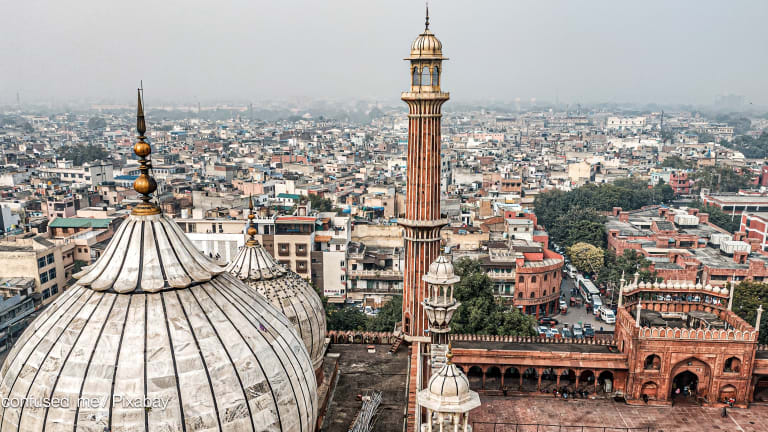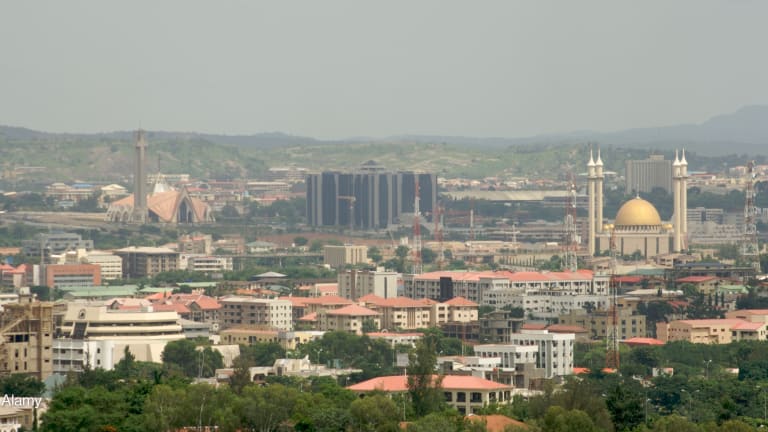Top global development groups in Russia: A primer
Russian nongovernmental organizations and companies have been involved in development efforts, though mainly domestically. We did find a few with a history of working in overseas aid projects. Here’s a rundown.
Until the last couple of years, Russia was a recipient of aid and had a limited role in international development. The same can be said of its nongovernmental organizations and private companies, with most involved in economic development efforts within the country. We did however find a few organizations that have been engaged in humanitarian relief and donor-funded projects, though mainly in limited capacities. As Russia moves with plans to create its own aid agency, these groups may become more active in the international development sphere. We’ve compiled the following list of organizations based on our conversations with Russia experts and search of contract award databases of donors such as the World Bank. Please note that this is a rough list and includes groups that may be minor players in international development. So if you know other similar organizations, let us know by leaving your comment below. BDO in Russia Type: consultancy Founded: 1989 Headquarters: Moscow Managing partner: Andrey Dubinskiy BDO in Russia is a member of global auditing and consulting giant BDO. It provided auditing services to the Dushanbe Water Supply Project (2003), Energy Loss Reduction Project (2008) and Energy Emergency Recovery Assistance Project (2011), all World Bank-financed schemes in Tajikistan. Its roster of clients also include the European Bank for Reconstruction and Development and the Soros Foundation. Center for Environment and Sustainable Development Type: NGO Founded: 1992 Headquarters: Moscow Executive director: Olga Ponizova Eco-Accord explores innovative approaches and raises awareness on sustainable development issues at the national and global levels. It has forged partnerships with like-minded organizations within and outside Russia, such as the International Institute for Sustainable Development, International Center for Trade and Sustainable Development and Oxfam Novib, as well as actively participates in processes relating to the environment and sustainable development in the Asia-Pacific region. In November 2011, itsubmitted a proposal on behalf of 20 organizations in Russia and CIS for the Rio+20 summit in June, on how countries can transition to green economies. FBK Type: consultancy Founded: 1990 Headquarters: Moscow President and managing partner: Sergey Shapiguzov FBK is one of Russia’s largest auditing and consulting companies, employing more than 900 people. It has worked with several donor agencies to audit and provide expert services to development projects in Russia and Central Asian countries. These include the Canadian International Development Agency,EBRD, U.K. Department for International Development, UNESCO and World Bank. Higher School of Economics Type: research university Founded: 1992 Headquarters: Moscow President: Alexander N. Shokhin In Russia, HSE holds the status of national research university, which the government grants to centers of excellence in research. It is also the country’s top university in the field of social sciences. HSE has an ongoing World Bank contract to train the Commonwealth of Independent States’ national statistical services staff in order to upgrade their professional skills. HSE faculty members are among the Russian participants in the Academic Partnership in Support of Teaching Development Aid Curriculum in Russia, a project sponsored by DfID and the World Bank and led by the U.K.’s Institute of Development Studies to mentor Russian academics in creating postgraduate and short courses for civil servants working in international development. It has 1,500 professors and researchers and more than 1,800 administrative employees. HMS Group Type: consultancy Founded: 1993 Headquarters: Moscow Managing director: Artem Molchanov HMS manufactures pumps for the environment, oil and gas, power generation, and water supply and utilities sectors in Russia and CIS, as well as performs design, installation, construction and commissioning of integrated oil and gas production and water facilities. Its subsidiary, Hydromashservice, has won contracts with EBRD and the World Bank for supplying needed equipment in water, agriculture and energy projects in several CIS countries. Institute for Urban Economics Type: think tank Founded: 1995 Headquarters: Moscow President: Nadezhda B. Kosareva IUE aims to find and advance solutions to social and economic problems in urban areas, particularly challenges related to housing, urban infrastructure, municipal management, land use and social protection. It says its researchers boast experience working in government, scientific research and educational institutes and international donor agencies. IUE, staffed by 70 people, was commissioned by the United Nations Development Program in 2010 to identify ways in improving the management of multiapartment buildings in the Moldovan municipality of Chisinau. In its annual report for the same year, it listed the World Bank and EBRD as among its clients, and the U.S. Agency for International Development Central Asia regional mission and Danish Church Aid as grantors. Ministry of Emergency Situations Type: government agency Founded: 1994 Headquarters: Moscow President: Sergei Kuzhugetovich Shoigu Since its creation, EMERCOM has been among the major providers of aid in the wake of international disasters, from the 1997 earthquake in Iran to the 2004 Asian tsunami and 2010 Haiti earthquake.EMERCOM is part of an elite group of government rescue organizations certified by the International Search and Rescue Advisory Group as “heavy search and rescue” team, which means it can coordinate disaster aid with other responders in affected countries and is regarded to have state-of-the-art resources, including heavy airlift capacity and mobile field hospitals. EMERCOM and USAID collaborate in international disaster response training and exercises, and according to a USAID fact sheet, were exploring opportunities for joint projects in disaster response, humanitarian aid or food assistance in other countries. Rusal Type: private corporation Founded: 2000 Headquarters: Moscow CEO: Oleg Deripaska Rusal is the world’s biggest aluminum producer. Aside from Russia, it implements social responsibility programs in five of the 19 countries where it operates, namely Guinea, Guyana, Ireland, Jamaica and Nigeria. A few examples of Rusal’s community investments: construction of a school for the underprivileged children of Fria, Guinea, and scholarships for Guineans pursuing degrees in mining, railroad operations, economics, building and construction, agriculture, water supply, medicine and human resources in Russia’s leading universities; building of water treatment and supply plants, installation of electric equipment, and power provision to the indigenous Hururu settlement in Guyana; and funding of schools attended by children of its local employees and support toward computer literacy programs for schoolchildren in Nigeria. Technopromexport Type: consultancy Founded: 1955 Headquarters: Moscow General director: Oleg Isaev Technopromexport is an engineering, procurement and construction firm focused on the power sector. It currently manages the World Bank-financed projects to rehabilitate the Hartha thermal power station in Iraq and the Naglu hydropower plant in Afghanistan, and was awarded contracts to help the Kyrgyz government improve the efficiency and reliability of the country’s power and district heating system. In April 2011, Technopromexport signed an accord with the Eurasian Development Bank to cooperate in implementing mid- and long-term investment projects in the power industry of the Eurasian Economic Community, a bloc that involves Belarus, Kazakhstan, Kyrgyzstan, Russia, Tajikistan and Uzbekistan. It has 12 overseas offices and employs more than 700 people. Nikita Agrawal contributed to this report. Check our lists of top aid groups in other global development hubs such as London, New York, Paris and Washington. Read more development aid news online, and subscribe to The Development Newswire to receive top international development headlines from the world’s leading donors, news sources and opinion leaders — emailed to you FREE every business day.
Until the last couple of years, Russia was a recipient of aid and had a limited role in international development. The same can be said of its nongovernmental organizations and private companies, with most involved in economic development efforts within the country.
We did however find a few organizations that have been engaged in humanitarian relief and donor-funded projects, though mainly in limited capacities. As Russia moves with plans to create its own aid agency, these groups may become more active in the international development sphere.
We’ve compiled the following list of organizations based on our conversations with Russia experts and search of contract award databases of donors such as the World Bank. Please note that this is a rough list and includes groups that may be minor players in international development. So if you know other similar organizations, let us know by leaving your comment below.
This article is exclusively for Career Account members.
Unlock this article now with a 15-day free trial of a Devex Career Account. With a Career Account subscription you will get:
- Full access to our jobs board, including over 1,000 exclusive jobs
- Your Devex profile highlighted in recruiter search results
- Connections to recruiters and industry experts through online and live Devex events
Start my 15-day free trialAlready a user?
Printing articles to share with others is a breach of our terms and conditions and copyright policy. Please use the sharing options on the left side of the article. Devex Pro members may share up to 10 articles per month using the Pro share tool ( ).
Eliza Villarino currently manages one of today’s leading publications on humanitarian aid, global health and international development, the weekly GDB. At Devex, she has helped grow a global newsroom, with talented journalists from major development hubs such as Washington, D.C, London and Brussels. She regularly writes about innovations in global development.








